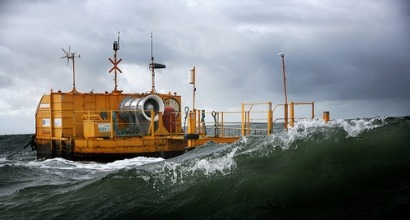
The west coast of Ireland boasts one of the largest concentrations of wave energy in the world, and consequently, Ireland has been pursuing the development of wave energy as a sustainable/renewable energy alternative. Wave energy conversion devices, such as the ones pictured here, are being developed and tested by a number of companies.
The ocean contains vast quantities of untapped renewable energy, but the environmental impact of collecting this energy is not fully understood. While underwater noise limits have been established by the European Union's marine environmental policy, there are no established global standards for the noise impact of wave energy collection devices on the marine ecosystem, and noise emissions from these devices have not been assessed for environmental impact. This collaboration seeks to accelerate methods and technologies that enable environmental impact assessment of these devices to ensure an environmentally friendly, sustainable approach to wave energy collection.
“Underwater noise is a global environmental issue that has to be addressed if we are to take advantage of the huge potential of ocean energy,” says European Union Commissioner for Research, Innovation and Science Máire Geoghegan-Quinn. “This project is a great example of collaboration among global companies, industry experts and government agencies, and will help us make real progress toward practical and sustainable ocean energy systems. I’m delighted to see Ireland playing a lead role in this area, which has great importance for meeting the EU’s energy challenges. ”
The system will consist of sensing platforms, a communications infrastructure, and advanced stream analytics that utilise cloud computing. The first test site, located in Galway Bay, has been part of the SmartBay collaboration involving IBM Research and the Marine Institute Ireland to monitor wave conditions, acoustics, marine life and pollution levels in and around the bay. Development of a full scale, grid connected test site on the west coast of Ireland near Belmullet, County Mayo, is underway. Teams from IBM Research & Development – Ireland and SEAI will work closely with Ireland’s Marine Institute, which is providing extensive technical marine services support at both sites.
Data will be shared
“Ireland has one of highest concentrations of wave energy in the world, presenting a significant opportunity to expand its renewable energy portfolio and develop new industry capabilities,” said Professor J. Owen Lewis, CEO SEAI. “This project supports Ireland’s commitment to the development of sustainable energy resources and the range of industrial technologies and services that will underpin their utilisation. ”
When fully operational, the system will produce one of the largest continuous collections of underwater acoustic data ever captured. This data will be made available to marine researchers and regulatory agencies to further advance knowledge of natural and man-made underwater sound, and help develop standards and reporting, benefitting marine environmental agencies as well as industries including renewable energy, shipping, and offshore oil and gas.
“While the issue of environmentally sound, renewable energy resources is clearly of global importance, the demand in Ireland is particularly great,” said IBM Vice President of Industries Research Katharine Frase. “In 2010, Ireland imported approximately 86% of its energy, the vast majority of which was fossil fuels, and the European Renewables Directive has set a target for Ireland to source 16% of its energy from renewable resources by 2020. ”
Ultimately, the team hopes to establish foundational platforms for comprehensive ocean energy monitoring with deep analytics that will tie in to smartgrid technologies.
This project is supported by a grant issued under the Ocean Energy Industry Prototype fund, administered by the Ocean Energy Development Unit in SEAI.
For additional information:

